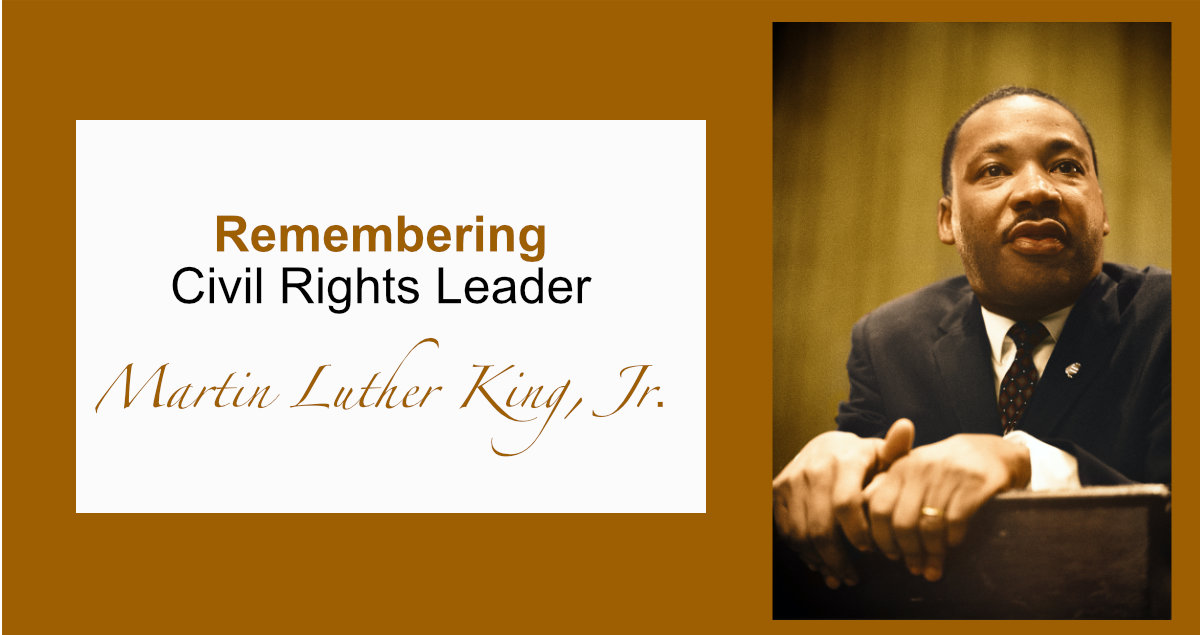This month’s biography features Martin Luther King, Jr., who led the civil rights movement from 1955 until his death in 1968. In spite of his courage and willingness to give everything for the movement, King was a reluctant hero. His true passion was his ministry, and as a young pastor, he was known for his “oratorical preaching” at Dexter Avenue Baptist Church in Montgomery where he began to serve as the pastor in 1954.
One year later, in 1955, Rosa Parks refused to give up her seat on a Montgomery bus, and King volunteered the church basement as a meeting place for black ministers to discuss what to do. At this meeting, the other ministers asked King to speak out about the issue and lead the Montgomery bus boycott. King was not asked because of his oratorical skills. Instead, he was chosen because he was relatively new to the area and not as well-known to the city fathers as the other pastors. King agreed to assume leadership only because no one else would do it.
The boycott lasted over a year and resulted in numerous arrests of King and the bombing of his house when his wife and infant daughter were inside. King’s wife, Coretta Scott King, stood by his side and refused to leave Montgomery even though her life and their children’s lives were in danger. Coretta said that she was married “to the movement” and knew her husband was born to do this work. Finally, the U.S. District Court issued a ruling that stopped racial segregation on all Montgomery buses. The publicity and traumatic events of this boycott brought King into the public eye and led to his lifetime leadership role as President of the Southern Christian Leadership Conference (SCLC), which he and other civil rights leaders founded in 1957. The conference was formed to assist black churches in organizing nonviolent protests and drew inspiration from the nonviolent protests of Mahatma Gandhi.
In August 1960, King was arrested during a sit-in with Atlanta students at a restaurant in Atlanta’s largest department store. The police released everyone within a few days but sentenced King to four months of hard labor. Both Nixon and Kennedy were asked to take sides. Nixon refused to get involved, but John F. Kennedy, Jr., called the governor of Georgia, a Democrat, and also asked his brother Robert Kennedy to put pressure on state authorities. This resulted in King’s release, and Martin Luther King, Sr., later endorsed Kennedy for president, helping him to narrowly win the 1960 election. In March 1961, King and other leaders negotiated a deal that agreed to desegregation of Atlanta’s lunch counters in the fall along with the court mandated desegregation of schools.
In April, 1963, the SCLC and the Alabama Christian Movement for Human Rights (ACMHR) decided during the Easter season to tackle racial segregation and economic injustice in Birmingham. Hundreds were arrested, and the city responded by obtaining a state injunction to stop the protesters. King decided to disobey the injunction, calling it civil disobedience, because the injunction was “unjust, undemocratic, and unconstitutional”; however, he knew that the bail funds were depleted. King was arrested on Good Friday and placed in solitary confinement without any idea when he would be released from jail. As he sat alone in his cell, King wrote his famous letter, “Letter from a Birmingham Jail,” as an answer to eight white pastors who condemned his protest on Easter Friday. A few days later, an anonymous person bailed him out. Some sources state that it was Billy Graham who paid the bail, even though Graham sometimes supported and sometimes criticized the civil rights movement.
To keep this protest going, some members of the SCLC believed the movement needed the involvement of young people, but King was hesitant to do that. James Bevel and Dorothy Cotton, members of the SCLC inner circle, encouraged him to involve students in the marches. On May 2-6, over 1,000 students marched into Birmingham. They were met with police dogs and powerful fire hoses, leading to hospitalization and jail for some children. Media coverage of this event shocked Americans and the world. This led to a compromise involving the removal of signs limiting restrooms and drinking fountains to whites only, desegregation of lunch counters, a job program for black workers, a biracial committee to oversee the agreement, and the release of protesters on bond.
Segregationists responded with violent attacks, and President John F. Kennedy sent federal troops into Birmingham. As a result of that protest, King was asked to speak at the March on Washington, where he delivered his famous, “I Have a Dream” speech. In 1964, the leaders of the civil rights movement achieved two of their goals: ratification of the 24th Amendment, which took away the poll tax, and the Civil Rights Act of 1964, which abolished discrimination in employment and education and made segregation of public facilities a crime. Near the end of the year, King was awarded the Nobel Peace Prize and donated the money to the movement.
The last two years of his life, King was criticized for his nonviolent approach. He responded by widening his efforts to include issues other than racism, focusing on economic justice and addressing poverty and unemployment for all people. On April 3, 1968, the night before his death, he told a church group that he had “seen the promised land,” and said, “I might not get there with you” but “we, as a people, will get to the promised land.” In spite of setbacks and violence, King never gave up. He continued to fight oppression, injustice, and voter suppression, which still exist in today’s society. As we remember his birthday, we must continue with his work.
Sources:
https://kinginstitute.stanford.edu/biography
https://en.m.wikipedia.org/MartinLutherKing
https://www.nobelprize.org.king
https://www.brittanica.com/MartinLutherKing
https://thekingcenter.org
Interview with Dorothy Cotton on YouTube: Kunhardt Film Foundation

